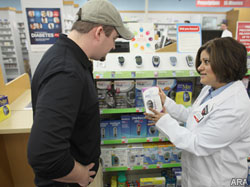
(ARA) – Chronic diseases, like heart disease and diabetes, are among the most common, costly and preventable of all health problems in the U.S., according to the Centers for Disease Control and Prevention (CDC). Fortunately, health screening tests are an easy way to detect these conditions early, so you can prevent symptoms from worsening. And, if you’re diagnosed with a condition, regular testing can help determine how well you’re managing the disease.
Knowing your healthy range is key. Strive for these numbers:
* For total cholesterol, the CDC identifies healthy levels as below 200 mg/dL. When levels reach 240 mg/dL or higher, you become at high risk for heart disease.
* For blood pressure, look for anything less than 120 over less than 80 mmHg, says the CDC. Levels above that indicate prehypertension, which can lead to chronic high blood pressure.
Blood glucose levels also should be checked if you are determined to be at risk for diabetes. Risk factors for diabetes include:
* Age 45 or older
* Overweight
* Family history of the disease
* High blood pressure
* Abnormal cholesterol readings
“Both high blood pressure and abnormal cholesterol levels increase your risk of developing Type 2 diabetes,” says CVS Pharmacist Susan Gordon. “For people who’ve been diagnosed with diabetes, consistent blood glucose monitoring is critical to keeping diabetes in control and preventing further complications.”
According to the American Diabetes Association (ADA), the basic goal for people with diabetes is a reading between 70 and 130 on an empty stomach, and less than 180 two hours after the start of a meal. If your blood sugar is too high for too long, you could be at risk for long-term complications.
Fortunately, at-home testing kits make it easier for people to know their healthy ranges, and some products are covered by insurance if you have to manage a chronic condition like diabetes.
“There are dozens of brands and styles to choose from when it comes to at-home testing kits,” adds Gordon. “Your doctor or pharmacist can help determine the one that’s best for you. If you have trouble reading small numbers, for example, you’ll need a meter with a large display. Your pharmacist also can identify ways to save on testing products, such as by using generic test strips.”
More information on diabetes testing can be found at www.cvs.com/diabetes.





